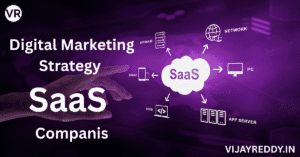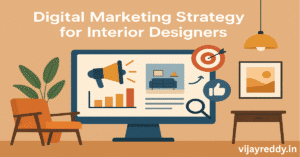Digital marketing has revolutionized every industry-and manufacturing and B2B companies are no exception. Traditionally, manufacturing businesses relied heavily on trade shows, cold calls, and referrals to generate leads. While these still play a role, today’s buyers (especially decision-makers in B2B) are researching, comparing, and making decisions online before they even talk to a sales rep.
👉 According to research, 67% of B2B buyer journeys are conducted digitally. This makes a strong digital marketing strategy essential for manufacturing or B2B companies to survive and thrive in 2025.
In this article, we’ll dive deep into:
✅ Why digital marketing is crucial for B2B & manufacturing
✅ Key strategies that work best
✅ Tools, channels, and best practices
✅ Step-by-step action plan to create your digital marketing roadmap
Let’s get started.
Why Manufacturing & B2B Companies Need Digital Marketing 🌍
Many manufacturing companies still believe digital marketing is “not for them.” But here’s the truth:
- B2B buyers research online before contacting vendors
- 70% of engineers & technical buyers prefer self-education through online resources
- Websites, LinkedIn, and search engines are the new trade shows
- Digital marketing is more cost-effective and measurable compared to traditional channels
Key Benefits of Digital Marketing for B2B:
✨ Build brand credibility & trust
✨ Generate qualified leads consistently
✨ Shorten long B2B sales cycles with better nurturing
✨ Reach decision-makers directly on LinkedIn & search engines
✨ Showcase expertise through content marketing
Core Digital Marketing Strategies for Manufacturing & B2B 🏭
Here are the most effective digital strategies that manufacturing and B2B companies can implement:
1. Search Engine Optimization (SEO) 🔍
SEO is the backbone of B2B digital marketing. Decision-makers search Google for solutions, suppliers, and product details. If your website doesn’t appear, you lose business.
SEO Focus for B2B/Manufacturing:
✅ Target long-tail keywords (e.g., “precision CNC machining services in India”)
✅ Optimize product/service pages with technical details
✅ Create dedicated industry-focused landing pages
✅ Write blog content around pain points and FAQs
✅ Build backlinks from industry directories & associations
💡 Example: If you manufacture industrial valves, target keywords like “industrial valve suppliers for oil & gas sector” instead of just “valves.”
2. Content Marketing 📝
In B2B, content is king 👑 because buyers need detailed, technical, and trustworthy information before making decisions.
Types of Content That Work for Manufacturing Companies:
- 📘 Whitepapers & E-books → Show technical expertise
- 📊 Case Studies → Prove results with real clients
- 🎥 Videos & Virtual Tours → Showcase manufacturing process & quality control
- 📰 Blogs & Articles → Answer industry-specific queries
- ❓ FAQs & Guides → Help decision-makers in the research phase
👉 Example: A company manufacturing solar panels can publish content like:
- “The Ultimate Guide to Choosing Industrial Solar Solutions”
- “5 Mistakes to Avoid When Partnering with Solar Panel Manufacturers”
3. LinkedIn Marketing 💼
LinkedIn is the #1 B2B social platform where decision-makers, engineers, and procurement managers actively engage.
How to Use LinkedIn for Manufacturing & B2B:
✅ Optimize company page with industry keywords
✅ Run LinkedIn Ads targeting decision-makers (CEO, Purchase Head, Engineers)
✅ Share case studies, industry reports, product launches
✅ Build thought leadership through articles & insights
💡 Example: Run a LinkedIn ad campaign targeting “Procurement Managers in Automotive Industry” with your precision parts manufacturing solution.
4. Pay-Per-Click (PPC) & Google Ads 💰
SEO is powerful but takes time. Google Ads & PPC campaigns help manufacturers generate quick visibility and leads.
PPC Strategies for B2B:
✅ Run ads for high-intent keywords (“custom metal fabrication supplier near me”)
✅ Use remarketing ads to re-engage visitors who didn’t convert
✅ Run Display Ads on industry websites & portals
✅ Leverage YouTube Ads to showcase your process
5. Account-Based Marketing (ABM) 🎯
ABM is a laser-focused B2B strategy where you target specific companies instead of a wide audience.
How ABM Works in Manufacturing:
- Identify top 100 target accounts (companies you want as clients)
- Create customized campaigns (emails, LinkedIn, ads) tailored to their needs
- Nurture decision-makers with personalized content & offers
💡 Example: If you are a heavy machinery manufacturer, you can target only “Construction & Infrastructure Companies with 500+ employees.”
6. Email Marketing 📧
Email remains one of the most effective B2B channels for nurturing leads and building long-term relationships.
Email Campaign Ideas:
- Monthly industry newsletters
- Product updates & case studies
- Event invitations (virtual trade shows, webinars)
- Automated drip campaigns for nurturing leads
💡 Example: A steel manufacturer can send a monthly newsletter with “Latest Trends in Steel for Automotive Sector.”
7. Video Marketing 🎥
Video is a game-changer for manufacturing companies because it builds trust and credibility faster.
Types of Videos That Work:
- Factory tours 🏭
- Product demo videos
- Client testimonial videos
- Technical explainer videos
- Safety & compliance videos
👉 A short “Behind the Scenes: How Our CNC Machines Ensure Precision” video can attract buyers looking for quality assurance.
8. Trade Show + Digital Hybrid Strategy 🌐
While trade shows are still important in manufacturing, combine them with digital.
✅ Promote trade show presence online
✅ Use LinkedIn & Google Ads to invite prospects
✅ Create landing pages for event registrations
✅ Follow up with email + LinkedIn campaigns after the event
9. Marketing Automation 🤖
B2B sales cycles are long. Without automation, many leads go cold. Tools like HubSpot, Zoho CRM, Marketo help automate follow-ups, lead scoring, and nurturing.
Benefits:
✨ Save time with automated workflows
✨ Nurture leads with personalized content
✨ Align marketing & sales teams
✨ Track ROI across campaigns
Step-by-Step Digital Marketing Roadmap for Manufacturing Companies 🛠️
Here’s how you can create a digital marketing plan in 2025:
Step 1: Define Goals 🎯
- Generate 500 qualified leads in 6 months
- Increase website traffic by 40%
- Improve LinkedIn engagement by 25%
Step 2: Identify Target Audience 👥
- Industries you serve (automotive, aerospace, construction)
- Decision-makers (Procurement Managers, Engineers, CEOs)
- Pain points (cost, quality, compliance, innovation)
Step 3: Build Strong Website 🌐
- Mobile-friendly & fast-loading
- Detailed product/service pages
- Lead capture forms & CTAs
- SEO optimized
Step 4: Implement Multi-Channel Strategy 🔄
- SEO for long-term traffic
- LinkedIn Ads for direct targeting
- Content marketing for authority
- PPC for quick results
- Email for nurturing
Step 5: Measure & Optimize 📊
- Use Google Analytics, LinkedIn Insights, CRM reports
- Track KPIs: traffic, leads, conversions, ROI
- Continuously refine campaigns
Tools for B2B Digital Marketing ⚒️
Here are some must-have tools for manufacturing/B2B companies:
🔹 SEO & Analytics → SEMrush, Ahrefs, Google Analytics
🔹 CRM & Automation → HubSpot, Zoho CRM, Salesforce
🔹 Email Marketing → Mailchimp, ActiveCampaign
🔹 Social Media → LinkedIn Ads Manager, Hootsuite
🔹 ABM Platforms → Demandbase, Terminus
Real-World Example 🏆
A precision engineering company used SEO + LinkedIn + ABM:
- Published blogs targeting aerospace industry pain points
- Ran LinkedIn campaigns targeting CEOs in aerospace firms
- Offered a free downloadable e-book as lead magnet
- Closed $2M worth of contracts in 8 months
Future Trends for B2B Digital Marketing (2025 & Beyond) 🔮
- AI-powered personalization 🤖
- Voice search optimization 🎙️
- AR/VR factory tours 🥽
- Sustainability-focused branding 🌱
- Predictive lead scoring 📈
Conclusion ✅
Digital marketing is no longer optional for manufacturing and B2B companies—it’s a necessity. With the right mix of SEO, content marketing, LinkedIn, PPC, ABM, and automation, manufacturers can consistently generate leads, build strong brand authority, and stay ahead of competitors.
👉 The key is to understand your buyers, create valuable content, and use digital tools to reach decision-makers at the right time.


